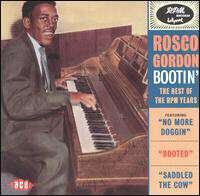Rosco Gordon
| Rosco Gordon | |
|---|---|
 | |
| Background information | |
| Birth name | Rosco N. Gordon III |
| Born |
April 10, 1928 Memphis, Tennessee, U.S. |
| Died |
July 11, 2002 (aged 74) Queens, New York, New York, U.S. |
| Genres | Blues |
| Years active | 1950–2002 |
| Labels | Sun, Chess, RPM, Vee-Jay |
Rosco N. Gordon III (April 10, 1928 – July 11, 2002)[1] was an American blues singer and songwriter. He is best known for his 1952 No. 1 R&B hit single, "Booted",[2] and two No. 2 singles, "No More Doggin'" (1952, RPM 350) and "Just a Little Bit" (1960, Vee-Jay 332).[3]
Biography
Gordon was born in Memphis, Tennessee, and grew up on Florida street. He was a pioneer of the Memphis blues style.[4] He made a number of his early recordings for Sam Phillips at Sun Records.[2] Gordon played piano in a style known as "the Rosco rhythm", with the emphasis on the off-beat. This rhythm was an influence on the Jamaican pianist Theophilus Beckford and hence on reggae music as a whole.[4]
"Booted" and "No More Doggin'" were both released in 1952.[4] Phillips sold the master of "Booted" to both RPM (owned by the Bihari brothers) and Chess Records (owned by Leonard and Phil Chess), and both labels released the track as a single.[2] The RPM release reached No. 1 on the Billboard R&B record chart.[3] Chess and the Bihari brothers later settled the conflict, with the Biharis getting exclusive rights to Gordon and Chess signing Howlin' Wolf to an exclusive contract.[5]
Gordon's last single to reach the charts was "Just a Little Bit" (1960).[3][4] In 1962, he gave up the music industry and moved to Queens, New York, with his new wife, where he purchased a partnership in a laundry business. Following his wife's death in 1984, he returned to performing in the New York area.
In 2002, he was invited by filmmaker Richard Pearce to be included in a documentary film about several blues musicians returning to Memphis for a tribute to Sam Phillips in conjunction with the May 2002 W.C. Handy Awards. The documentary, The Road to Memphis, aired on PBS television. Six weeks after filming finished, Gordon died of a heart attack at his apartment in Rego Park, Queens.[2] He was 74 years old.[2] He was interred in the Rosedale Cemetery in Linden, New Jersey.
"No More Doggin'" was covered by the Groundhogs on their 1972 album Hogwash[6] and by Colin James on his 1993 album Colin James and the Little Big Band.
References
- ↑ Eagle, Bob; LeBlanc, Eric S. (2013). Blues - A Regional Experience. Santa Barbara: Praeger Publishers. p. 246. ISBN 978-0313344237.
- 1 2 3 4 5 "Biography by Bryan Thomas". Allmusic.com. Retrieved June 1, 2009.
- 1 2 3 Whitburn, Joel (1988). Top R&B Singles 1942–1988. Record Research, Inc. p. 170. ISBN 0-89820-068-7.
- 1 2 3 4 Russell, Tony (1997). The Blues – From Robert Johnson to Robert Cray. Dubai: Carlton Books Limited. p. 114. ISBN 1-85868-255-X.
- ↑ Cohodas, Nadine (2000). Spinning Blues into Gold. St. Martin's Press. p. 64. ISBN 0-312-26133-0.
- ↑ "Hogwash, album details". Thegroundhogs.co.uk. Retrieved 2014-07-12.
External links
- Rosco Gordon full biography
- Rosco Gordon discography on Soulful Kinda Music website
- PBS website for The Road to Memphis
- Rosco Gordon overview
- Rosco Gordon interview
- Rosco Gordon biography